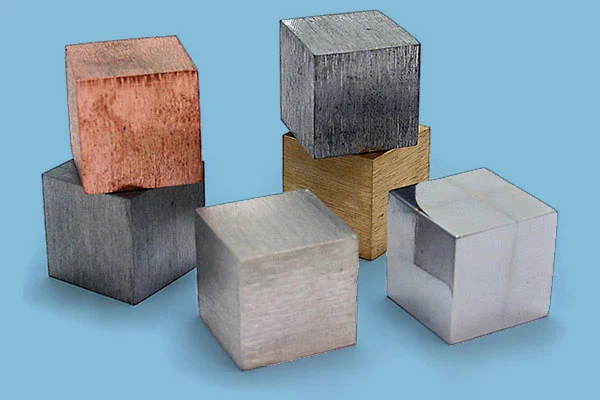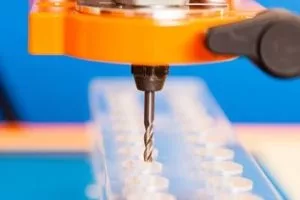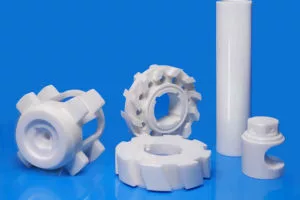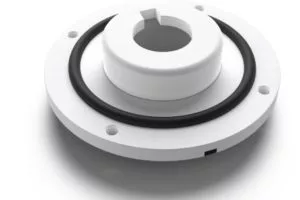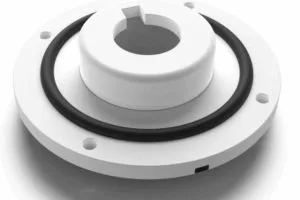CNC machining is a highly accurate and repeatable manufacturing process used for prototypes and production parts. A subtractive process, CNC machining involves cutting material away from a solid block using computer-controlled cutting tools like drills and lathes. The result is a professional-quality part suitable for mechanical use.
One of the biggest advantages of CNC machining is its material versatility. Though commonly used to cut aluminum and steel alloys, the process is equally suited to a wide range of engineering metals, as well as high-quality plastics. Many of these materials can be treated with a variety of finishing options after machining.
Before diving straight into a CNC machining project, it’s worth getting acquainted with the large number of material options at your disposal.
Prioritizing Material Properties
Given the vast array of material options for CNC machining, it is highly likely that there will be a suitable material for your prototyping or production job.
Finding that material, however, depends on your priorities: do you need a metal with exceptional mechanical properties, such as a titanium alloy? Or is speed a priority, leading you to more machinable materials like Aluminum 6061 or a plastic like Delrin? Do you simply want a machined prototype at the lowest possible price?
Factors to consider when choosing a material for CNC machining include:
- Price
- Machinability
- Strength
- Weight
- Chemical resistance
- Thermal resistance
- Hardness
- Weldability
Of course, it won’t always be possible to find a material that meets all of your criteria to the highest possible degree. The very strongest machining materials are rarely the cheapest, and choosing added strength may lead to a reduction in chemical resistance or some other property.
Identify which properties are of greatest importance and work from there.
Selecting a Material
The best way to determine the best and most suitable CNC machining material is to consult an expert like China Medical CNC Machining Inc.. Once we know the outline of your project, we can help you come to a decision regarding materials, finishing processes and much more depending on your goals, budget and timeframe.
However, if you want to draw up a shortlist of potential machining materials in advance, it is worth getting acquainted with the options out there.
From versatile aluminum alloys to specialist engineering plastics, here are some of the materials from which CNC parts can be made:
Aluminum
Aluminum is a versatile metal that is affordable and easy to machine. It has a good strength-to-weight ratio, and its sheer variety means there is a suitable alloy for most machining projects.
Common aluminum grades include:
| Grade | Example application | Advantage | Disadvantage |
| 6061 | General fabrication | Versatility | |
| 7075 | Aerospace | Strength | Weldability |
| 5052 | Marine | Corrosion resistance | |
| 3003 | Food | Formability | Not heat treatable |
China Medical CNC Machining Inc. also offers aluminum machining in grades 1060, 1100, 2024, 3004, 5083, 5754, 6082, 6063, 6083, 7050, 5A12 and 5A02.
Stainless Steel
Widely used in a number of industries due to their corrosion resistance and other desirable properties, stainless steels come in a variety of grades, many of which are suitable for CNC machining.
Common stainless steel grades include:
| Grade | Example application | Advantage | Disadvantage |
| 304 | Medical devices | Corrosion resistance | |
| 303 | Aerospace | Machinability | Slightly lower corrosion resistance |
| 316 | Architecture | Corrosion resistance | Price |
Steel
Mild steels and alloy steels come in many machinable variants, many of which are suitable for general fabrication, tooling and specialist industries.
Common steel grades include:
| Grade | Example application | Advantage | Disadvantage |
| A36 | Construction | Strength | |
| 1018 | Machinery | Weldability | Machinability |
| Alloy Steel 4130 | Aerospace | Toughness |
China Medical CNC Machining Inc. also offers steel machining in Alloy Steel 4140 and ASTM A36.
Other Metals
Beyond aluminum and steel, it is also possible to machine metals such as brass, copper, titanium and zinc, offering engineers a wider range of physical properties for their parts. Copper, for example, is an excellent conductor, making it suitable for electrical parts.
Other machinable metals include:
| Grade | Example application | Advantage | Disadvantage |
| Brass C360 | Industry | Machinability | |
| Copper | Electrical components | Thermal conductivity | |
| Titanium 6Al-4V | Aerospace | Strength-to-weight | Price |
China Medical CNC Machining Inc. also offers metal machining in other brass, copper and titanium grades, as well as Zinc Sheet Alloy 500.
Plastics
CNC machines are equally capable of cutting plastics, which may be preferred for cost, electrical insulation or other reasons. Plastics are often a suitable prototyping material when the final part will be made with injection molding.
Machinable plastics include:
| Grade | Example application | Advantage | Disadvantage |
| POM (Delrin) | Mechanical parts | Machinability | Acid resistance |
| PTFE (Teflon) | Electrical components | Heat & chemical resistance | |
| ABS | Consumer products | Impact strength | Heat resistance |
China Medical CNC Machining Inc. also offers plastic machining in Acrylic, G-10 Garolite, Nylon, PEEK, Polycarbonate and Polypropylene.
Contact China Medical CNC Machining Inc. for a fast CNC machining quote.
Share on social media...
Tags
Popular Topics
1
Understanding Plastic Fabrication Processes: A Complete Guide
Ayotomiwa Omotosho13 Feb
2
Ceramic CNC Machining: Another Option for Custom Manufacturing
Oluwafemi Adedeji13 Feb
3
The Overmolding Design Guide You Must Never Forget
Oluwafemi Adedeji13 Feb
4
What You Need to Know About the Overmolding Process
Paul Richard05 Feb

